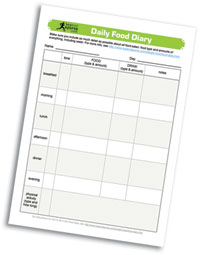Taking the time to record your food and drink intake may seem like a lot of hard work, but it is one of the most effective tools to assist with weight loss. Here are some of the benefits of keeping a food diary.
- You can use it to help you determine the volume and composition of your current eating habits.
- Food diaries force you to think consciously about what you are eating, and keeps you focused on your weight loss program.
- A food diary will help you visualize what you eat. When your food intake is written down, areas where your diet goes wrong may become more obvious.
- It helps keep you honest too. It does not work if you 'forget' some items or pretend that certain calories don't count.

- The food diary can serve as a reminder about nutrition goals such as drinking enough water, or having the right number of serves of fruit, veggies, dairy, protein, cereals/grains and good fats each day.
- If you are keeping a long term food diary, you can look back over the records and see periods where things went right or wrong. You may start to see some patterns emerge regarding why you are eating when you do, increasing awareness and assisting behavior change.
- A health professional or dietitian can use an accurately recorded food diary to determine underlying nutritional problems, give professional dietary advice and recommendations.
Related Pages
- Download one of our free Food Diaries
- See information about food diary analysis
- Benefits of keeping a food diary for athletes
- Instructions for completing a food diary
- List and Discussion of Dietary Assessment Methods
- Monitoring portion size


 Current Events
Current Events